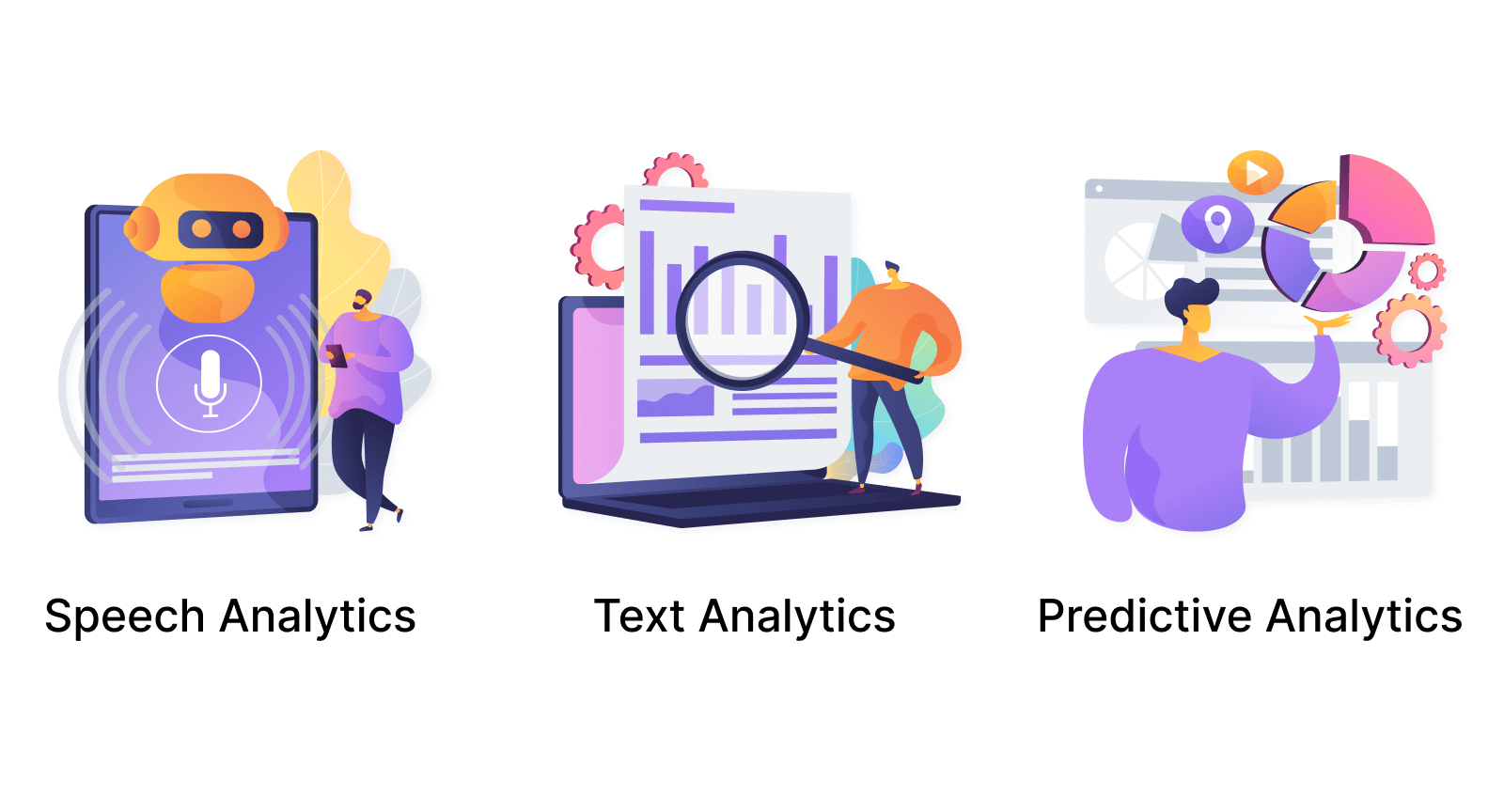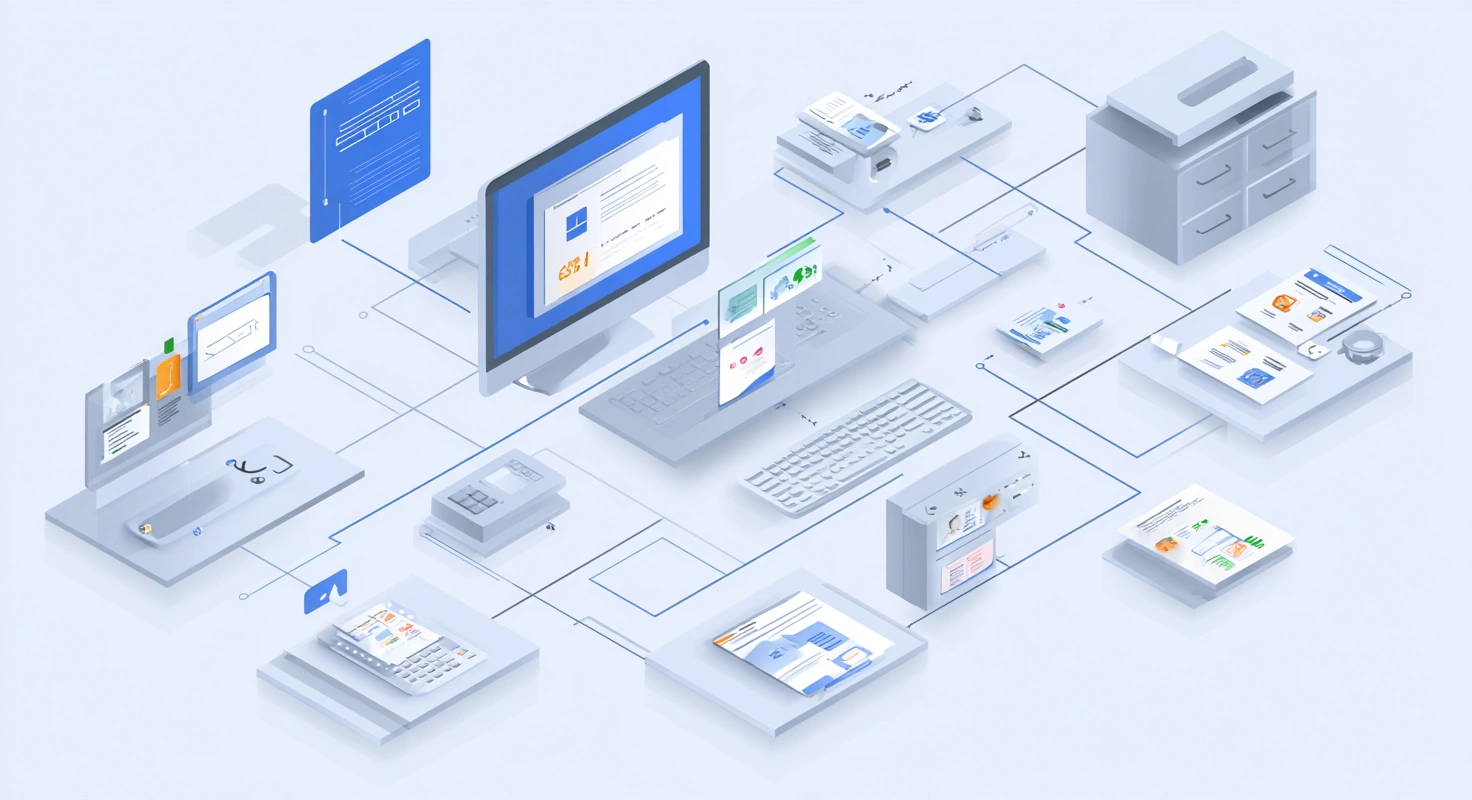Artificial intelligence (AI) is a transformative force that has the potential to reshape a variety of industries, including call centers, in today's rapidly evolving technological landscape. Call center managers are aware of AI technology's potential benefits and concerns.
With the help of pertinent examples and the fundamental truth, this blog seeks to present a clear analysis of whether artificial intelligence and AI technology examples will eventually replace human agents.
Recognize the potential of AI to transform industries and enhance lives.
Recent Effects of AI on Contact Centers
AI has recently significantly impacted contact centers, transforming various aspects of their operations.
Here are some ways in which AI has influenced and enhanced contact centers:
- Improved Efficiency: AI-powered chatbots and virtual assistants have become integral to handling routine customer inquiries and tasks. They can respond immediately to common questions, freeing human agents to focus on more complex and value-added interactions. This efficiency has led to reduced call waiting times and increased customer satisfaction.
- Enhanced Customer Service: AI technologies, such as natural language processing and sentiment analysis, enable a better understanding of customer emotions and intentions during interactions. This helps agents tailor their responses, leading to more empathetic and personalized customer service experiences.
- Predictive Analytics: AI-driven predictive analytics tools have enabled contact centers to accurately forecast call volumes and customer needs. This allows for better resource allocation, ensuring the right number of agents are available during peak times to minimize wait times and improve service quality.
- Quality Monitoring and Training: AI-powered speech analytics can analyze customer-agent conversations to identify areas for improvement in real-time. Contact center managers can use these insights to provide targeted training and coaching to agents, enhancing their skills and performance.
- Customer Self-Service: AI-driven self-service options, such as interactive voice response (IVR) systems and chatbots, empower customers to find answers to their queries and resolve issues independently. This not only improves customer satisfaction but also reduces the workload on human agents.
- Omnichannel Support: AI helps contact centers provide consistent support across various communication channels, including phone, email, chat, and social media. AI-driven solutions can ensure that customer inquiries are seamlessly transferred between channels without loss of context.
- Cost Savings: AI technologies can reduce operational costs for contact centers. Organizations can save costs by automating repetitive tasks and optimizing resource allocation while maintaining or improving service quality.
- 24/7 Availability: AI-powered virtual agents and chatbots can offer round-the-clock customer support, allowing businesses to efficiently serve global customers in different time zones.
- Real-time Language Translation: AI-driven language translation tools enable contact centers to provide support in multiple languages, breaking down language barriers and expanding their customer base.
- Fraud Detection: AI can help detect fraudulent activities by analyzing customer data and transaction patterns, protecting customers and businesses from potential security threats.
AI has profoundly impacted contact centers by enhancing efficiency, improving customer service, enabling data-driven decision-making, and offering cost-effective solutions. It has allowed contact centers to adapt to changing customer expectations and provide a more seamless and personalized experience, ultimately increasing customer satisfaction and loyalty.

Top 5 Reasons Against AI Replacing Humans in Call Centers
While AI has made significant advancements in call center technology, there are several compelling reasons why it is unlikely to replace humans in this industry completely.
Here are the top five reasons why AI will not replace humans in call centers:
- Complex and Emotional Interactions: Human agents handle complex customer inquiries requiring empathy, emotional intelligence, and critical thinking. Many customer interactions involve unique situations, complex problems, or emotional support, which AI struggles to navigate effectively. Customers often seek human understanding and compassion, making human agents indispensable in such cases.
- Cultural and Language Nuances: Call centers serve diverse customers with varying cultural backgrounds and languages. Human agents possess the ability to understand cultural nuances, idiomatic expressions, and language intricacies, ensuring clear and effective communication. AI may need help with these subtleties, potentially leading to misunderstandings or miscommunications.
- Unpredictable Scenarios: Call center agents frequently encounter unpredictable scenarios that require adaptability and problem-solving skills. They can quickly adjust to new situations and think on their feet to find solutions. While capable of learning and improving, AI is still limited in its ability to handle unexpected or novel situations without human intervention.
- Building Rapport and Trust: Customer trust and rapport are crucial in the call center industry. Human agents can establish connections, express empathy, and provide a personal touch that AI cannot replicate. These human qualities are essential to nurturing customer relationships and fostering loyalty.
- Ethical and Moral Decisions: Some customer interactions may involve ethical or moral decisions that require human judgment. For instance, deciding on exceptions to company policies or handling sensitive customer issues may involve ethical considerations. Human agents can navigate these gray areas by applying ethical principles and company values, which AI cannot do autonomously.
While AI software solutions has undoubtedly improved efficiency and automation in call centers, it is unlikely to replace humans entirely. The human touch, empathy, adaptability, and ability to handle complex and emotional interactions make human agents invaluable in delivering exceptional customer service.
AI is a valuable tool that can complement and support human agents, enhancing their capabilities rather than replacing them entirely.
This blog is just the start.
Unlock the power of Convin’s AI with a live demo.

The Truth About AI and Call Centers
Let's address the pressing question: Will AI technology replace call center agents?
The truth is that AI technology products have the potential to automate certain tasks and processes within call centers, but they are unlikely to replace human agents completely.
Here's why:
- Complex Queries and Emotional Support: While AI chatbots can handle routine and straightforward inquiries effectively, they often struggle with complex queries that require human understanding, empathy, and emotional support. Human agents best handle customer service situations involving anger, frustration, or empathy.
- Adaptability and Problem Solving: Human agents can adapt to new and unexpected situations, think critically, and solve complex problems. AI, while capable of learning and improving, is still limited in its problem-solving abilities.
- Cultural and Language Sensitivity: Human agents can understand diverse customer bases' cultural nuances and language intricacies. AI may need help with these nuances, leading to misunderstandings or miscommunications.
Customer Experience: Superior customer service frequently depends on the human element representatives offer. AI can enhance efficiency but may fail to deliver a truly exceptional customer experience.

AI Technology Examples
Before delving into whether AI will replace agents, it's essential to understand the vast array of AI technology examples that exist today. AI encompasses various capabilities, from natural language processing (NLP) to machine learning and generative AI.
Here are some examples of artificial intelligence technology products:
- Chatbots and Virtual Assistants: Chatbots are AI-powered programs that can engage in text-based conversations with customers, offering quick solutions to common inquiries. Virtual assistants like Siri, Alexa, and Google Assistant provide voice-activated AI interactions.
- Predictive Analytics: AI can analyze large datasets to predict customer behaviors, enabling businesses to make real-time data-driven decisions.
- Speech Recognition: AI technology can transcribe and analyze spoken language, making it useful for customer service applications and transcription services.
- Generative AI: Generative AI technology examples include human-like text, images, and music. This technology has applications in content generation and creative fields.
Examples of AI and Agents Working Together
Rather than viewing AI as a replacement for agents, it's more productive to consider how AI can complement human agents in call centers.
Here are some artificial intelligence examples:
- AI-Powered Routing: AI can analyze customer inquiries and intelligently route calls to the most suitable human agent, reducing wait times and improving efficiency.
- Call Center Analytics: AI can help analyze call data to identify patterns and trends, allowing managers to optimize agent training and performance.
- Chatbot Assistance: Human agents can work alongside AI chatbots to handle routine queries efficiently, freeing up agent time for more complex tasks.
Embracing AI: The Future of Contact Centers with Convin
AI technology has undoubtedly transformed the call center landscape by automating routine tasks and providing valuable insights. However, it is unlikely to replace human agents entirely. The ideal approach for call center managers is to harness AI's capabilities to enhance agent performance and improve the overall customer experience.
AI and agents can work together to achieve the best results, offering the perfect balance between efficiency and personalized service.
Convin is at the forefront of harnessing AI's potential in the contact center industry. Our dedication to providing unparalleled customer experiences has driven us to embrace AI as a strategic asset proactively. In synergy with our human agents, AI is pivotal in optimizing efficiency, enhancing service quality, and ensuring customer satisfaction.
Convin has streamlined routine tasks through AI power, enabling rapid and precise responses to customer inquiries. Predictive analytics allows us to anticipate customer needs, ensuring that our skilled agents are available when and where they are needed most.
Additionally, AI-driven speech analytics helps us monitor and improve agent performance, facilitating ongoing training and coaching. This commitment to AI extends to providing consistent multichannel support and cost-efficient solutions while tailoring interactions to create personalized experiences.
Convin's role in leveraging AI is a testament to our commitment to innovation and progress. We recognize that the future of contact centers hinges on the seamless integration of AI and human expertise, and we are steadfast in our mission to lead the way in this transformative journey, continuously exploring new AI technologies and strategies to provide exceptional customer support. At Convin, when used judiciously, AI is a powerful tool that empowers our agents and enhances our ability to deliver extraordinary customer service.
Are you curious about how Convin is using artificial intelligence to transform contact centers in the future? Don't miss the opportunity to witness our innovative solutions in action. Schedule a demo with us today, and let us show you firsthand how we can elevate your customer service experience to new heights.
FAQs
1. Could AI replace real estate agents?
AI can automate some tasks in real estate, but it's unlikely to replace real estate agents entirely due to the complex and human-centric nature of the industry.
2. Can artificial intelligence replace human intelligence, with example?
AI can assist human intelligence but not replace it. For example, AI can analyze vast datasets for medical diagnoses, but the final decision and empathy come from human doctors.
3. Which jobs cannot be replaced by AI?
Jobs that heavily rely on creativity, emotional intelligence, and complex decision-making, such as artists, therapists, and certain leadership roles, are less likely to be replaced by AI.
4. Can artificial intelligence replace human intelligence with an example?
Like the previous answer, AI can assist human intelligence but not replace it entirely. For example, AI can help analyze legal documents but needs more understanding and interpretation than human lawyers provide.
5. Can AI never replace humans? True or false?
True. AI can automate tasks and provide assistance, but it cannot fully replace humans' unique qualities and capabilities, especially in areas requiring creativity, empathy, and complex problem-solving.
6. Who is the father of AI?
The term "father of AI" is often attributed to Alan Turing, who laid the theoretical groundwork for AI with his concept of the Turing machine and contributions to computer science. However, AI is a field developed by many researchers over time, and there is no single "father" of AI.










.avif)